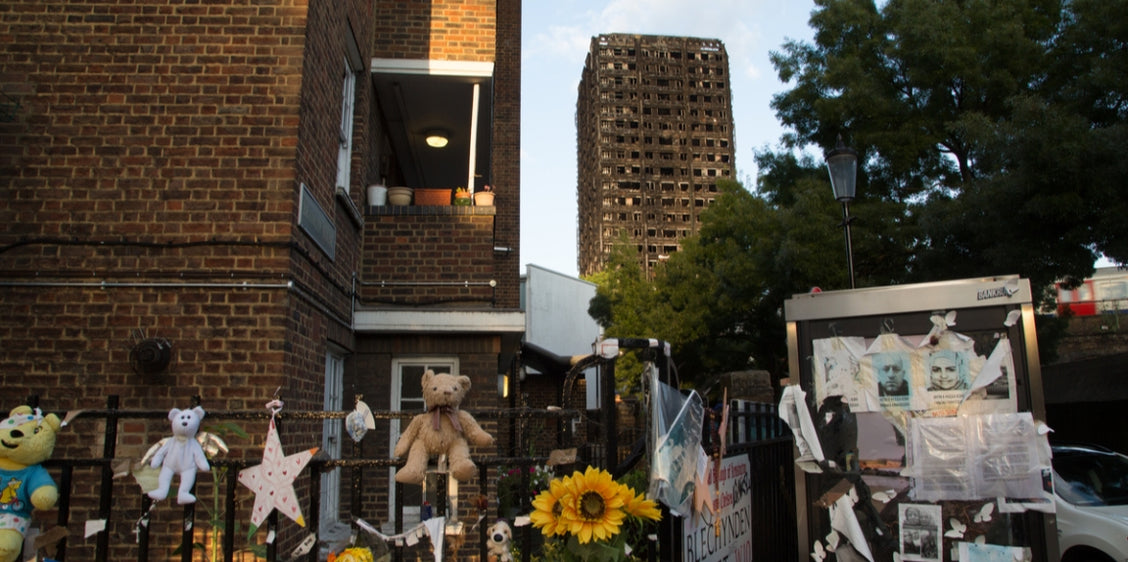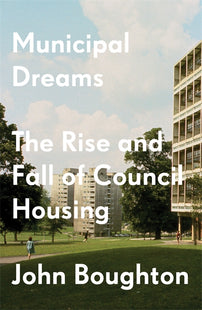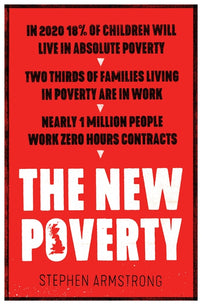A Failure of State: Community and Council in the Grenfell Aftermath
Daniel Renwick, a community youth worker who witnessed the Grenfell Tower fire and its aftermath, responds to Andrew O'Hagan's recent London Review of Books feature, The Tower.

I was asleep as the fire started. I awoke to find so many missed calls on my phone that I panicked. I was at a friend's house, I went back to mine, got my stuff and headed to the streets around the Rugby Club, where I met with musician and local activist, Niles Hailstones, and Ed Daffarn, Grenfell resident and activist, among others.
Ed was being bombarded by the media, so Niles and I stayed with him and screened calls on his phone. Ed took us into the Rugby Club, where the housing officers told survivors that those in the most immediate need would get housed straight away. They encouraged those who were able to to look for alternatives.
After leaving the Rugby Club, I walked with Ed to Piers Thompson’s house on the Silchester Estate, then went to the Harrow Club. It was chaos. Eamonn, the club’s lead youth worker, asked if I could coordinate the setting up of beds on the football pitch at the top of the club. We set up over 130 beds. I shared the image on social media. I then headed to the Village, where Niles had called for us to gather. While I was walking under the Westway, Eamonn called asking me to remove the image of the beds as the TMO (the Tenant Management Organisation) had not identified the Harrow Club as a provider of shelter.
When I got to the Village, where a number of community elders were already present, we strategised a little, before more people turned up. The conversations and plans overlapped, with tensions coming to the fore, until the tonnage of provisions crushed our ability to coordinate anything. I stayed at the Village until about 1am, before I went to stay at Kareem’s (AKA Lowkey) house, where we planned on making some videos the next day.
As we awoke, the media circus was in full swing. You couldn't swing a bag without hitting a camera. We saw Christos, a survivor of the fire, at the bottom of the Lancaster West estate after he had just been discharged from hospital. Kareem interviewed him . As we finished the interview, Ishmahil Blagrove had just left St Clements, following a meeting with Jeremy Corbyn, and it was at the bottom of Lancaster West where he infamously accosted the Sky journalist. We went and met with Akala and Joe Delaney, whom I interviewed , and after a while, we were back at the Village, where I helped unload boxes, before trying to edit some of the stuff I'd shot. It was chaotic.
I had heard rumours that there was no authoritative list being made by the council. Eve Wedderburn, a local campaigner, had been at Rugby Club on the morning of the fire and spoke to me on camera about how it was in the hands of the community to account for who survived, and who didn’t. The lists, I was told, were constructed in an ad hoc fashion, scrawled in notebooks and on scrap paper. Those who held these documents were fearful of what they held. At that time, the numbers acknowledged as dead or missing in state and press statements were much lower than the tallies on the ground. Their fears were intensified as the reports of number suppression began to gain traction. The council were seeking to corral all the information they could relating to who lived in the building, but distrust had already begun setting in.
I edited all the videos I had and struggled to get them online, falling asleep on Niles' sofa, after a few electricity issues. I woke, sleep deprived and exhausted, and tried to do productive things. But I realised how frayed I was and headed home, avoiding the protests. It felt wrong and too early.
I slept at home on the Friday and woke on the Saturday, rushing to an emergency meeting at Maxilla coordinated by the Radical Housing Network. There were not many members of the community there and I conveyed my belief to those who at the meeting that the community of North Kensington are able to organise themselves. However, they were struggling under the immense strain of the sheer amount of provisions that were coming into the area. I sent a team of people to the Harrow Club, and another group to the Village while myself and Ewa Jasiewicz went to key provisions to establish what contact, if any, frontline workers had had with the council or TMO. The film I had made, in haste, laid bare that there had been no contact with the council or TMO for four days after the fire, many were not to have meaningful contact for a lot longer.
It was at this point that I began describing the situation as a failure of state. I spent days going from place to place, all of which had become spaces of logistical management given the massive outpouring of aid. The charity drive lead to the creation of individual silos, and each provision had its fair share of alpha-male machismo and self-aggrandisement to deal with. Yet, within them all, something obvious and real hit me time and again; the governmental set-up of North Kensington had built in an incapacity, which beyond any more editorialisation, had voided the relationship of state to subject. The only guarantor of community order and social cohesion was the community itself. Anarchists would call it mutual aid, we called it the work of necessity.
When Andrew O’Hagan in the most recent issue of the London Review of Books mounts his defence of the council, he substantiates the claims made by Barry Quirk in his report Failed By The State , that while the council was working they couldn’t be seen. It is strange that key providers of basic services in the aftermath of the fire, where some of the survivors and bereaved families found respite, did not see the council either. Surely, if we are going down the ‘patrician tories care’ route, that’s the kind of work they should have been busy doing? Only they were not. Anthony Wilks may call this The End of an Experiment in his documentary accompanying O’Hagan’s article, but for there to be meaningful leadership from behind, there must have been communication and coordination. Yet, again, there was none.
The evidence gathered by O’Hagan came from the members of the local community. They were told that their accounts would be unedited; they were anything but. Reading his article is like looking through a kaleidoscope, I see everything I know refracted into something unrecognisable. There are some home truths to mull over in a piece so bloated. However, beneath the interesting takes, challenges and clarifications, lies a deeply insidious piece of writing, which states as fact what cannot be known at this point, however shit hot you think you, or your researchers, are. Most of what O’Hagan asserts about the lack of culpability of the council will be addressed in the Public Inquiry, and it is the importance of this process for bereaved families, survivors and others that takes precedence here. The truth will come out. Some of what O’Hagan has said will be accepted in time. A lot of it will be refuted by real evidence.
There is now more than enough evidence to establish as fact that, on many fronts, the council abysmally failed the people of North Kensington in the aftermath of the fire. The fact that support was not marshalled by the state or local authority meant the relief work was left to volunteers; work which left a heavy financial and emotional toll on those who performed it.
It is not coincidental that the LRB put the online version of the article out as the final testimonies from bereaved families and survivors were heard at the Public Inquiry. Within the LRB, Kensington’s toryism telegraphs its moves in the Public Inquiry. For this, we have O’Hagan to thank.
[book-strip index="1" style="display"]


